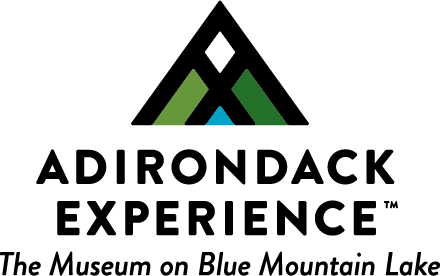
See you this summer!
2024 Open Dates:
Friday, May 24, 2024 – Monday, October 14, 2024
Friday, May 24, 2024 – Monday, October 14, 2024
10am – 5pm | Open 7 days a week, including holidays
Have you ever used a tour guide to explore an unfamiliar place? We don’t have tour guides in the Adirondacks, but we do have guides. Navigating the wilderness is no easy task, especially in the 1800s. Learn about the fascinating job of the Adirondack guides and their importance in helping visitors safely discover the lakes, forests, and mountains of the Adirondacks, both in the past and today.
An Adirondack guide (left) and his sport. (P008149)
Header Image: Seneca Ray Stoddard, 60 View from the Stern Seat, Photo features Charlie Blanchard, a guide, rowing a guideboat and was taken from inside the boat. Photographer Seneca Ray Stoddard’s legs can be seen in the foreground. (P007922)
Advertisement for a local camping and fishing guide in the Long Lake/Tupper Lake region. (Library Record 12446)
Seneca Ray Stoddard, 452 Game in the Adirondacks, 1889. Rob Peck and the LaPrairie brothers playing cards (P022781)
Seneca Ray Stoddard, Ed. McAlpin – later General, c. 1890 The hunter McAlphin sits in the stern of the guideboat. His guide, Jack Richards, sits in the bow next to a hunting dog. (P019986)
Read aloud: Students can follow along while listening. Click here to download a copy of the transcript.
Vocabulary: Explore new words. Students listen to high-level vocabulary in context. Have them identify the definition afterward. Click here for the vocabulary page.
Practice your persuasive writing! Advertisements at hotels or in guidebooks were a great way for guides to find work. Have students imagine they are Adirondack guides and create a persuasive advertisement about their services. They can include ideas such as:
• What skills do they have?
• What sets them apart from other guides?
• What will they charge for their services?
Planning a Trip. As a guide, you have to be a very good planner. Have students plan their own trips. They can include ideas such as:
• Length of trip
• How much will you charge the sport(s)
• Map of different locations you’ll travel to
• What activities you will be doing with your sports. (e.g. hunting, fishing, canoeing)
• What supplies you’ll need:
• Fishing poles, canoe/guideboat, traps.
• Food, tent
Write your own campfire story! After listening to a guide tell his fishing adventure story, have students write/tell their own story about a particular event or day in their life. Prompt students to write how the event or day actually happened. Then, encourage students to turn their story into a tall tale, incorporating fictional and larger-than-life details into their original story.
Higher grade level students may want to explore some topics in more depth.